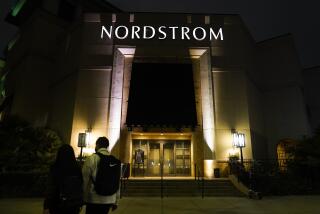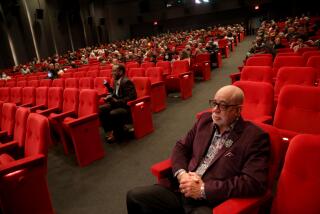Selling Nordstrom-Style Service, Almost to a Hair
- Share via
It all started with a bad haircut.
In Spokane, Wash., where the mullet is still a socially acceptable hairstyle, Bill Nordstrom was disappointed after a trip to the barber.
The result was Weldon Barber, a string of upscale men-only barbershops devoted to the customer service his family’s Nordstrom department stores made famous.
Nordstrom, 41, is the main investor in Weldon Barber, which opened six shops in Spokane and Coeur d’Alene, Idaho, last fall.
The company’s name, a play on the words “well done,” was chosen in a series of meetings between Nordstrom and Julie Kembel, a longtime friend of Nordstrom’s wife, Suzette.
The former college friends reunited after Bill Nordstrom resigned in August 2000 as executive vice president of Nordstrom Inc.’s East Coast operations and moved back to Spokane, where Suzette Nordstrom grew up.
A former executive vice president and cousin of Nordstrom Inc. President Blake Nordstrom, Bill Nordstrom spent time in the 1980s at the family’s Spokane store.
“My background [in retail sales] led me to believe it’s possible to do this,” Nordstrom said. “My wife said maybe this is something that would be a good business. It occurred to me it might be.”
Visitors to the shops are offered coffee, cola or bottled water as they wait in oversized leather chairs. A coffee table overflowing with men’s magazines is under a large plasma screen television.
For $22, customers get scalp and shoulder massages, hot mint-scented facial towels, a razor trim and a haircut by a specially trained barber. Hair coloring and beard trims are extra.
Weldon Barber is being launched as traditional barbers are closing but spa-style men’s parlors are gaining popularity.
Several national marketing surveys estimate the men’s hair-care industry to be a proposition worth $10 billion to $15 billion a year. The Department of Labor’s Bureau of Labor Statistics forecasts growth in specialty barbering, even though traditional barbershops are hanging on.
“We have been looking at growth in the number of salon-spas exclusively for men,” said Wendy Liebmann, president of WSL Strategic Retail, a New York market research company.
“When we started looking at the industry, traditional barbershops were, statistically, the fastest-shrinking category in the ‘beauty’ industry,” Nordstrom said.
Commodity franchises, such as Supercuts Inc., are part of the reason, he said.
“It’s hard for barbershops to compete against price-competitive models,” he said. “We thought there was room in the market for an alternative that was more service-oriented. What we have found, it’s being well received.”
Plans are for expansion to other cities in the Northwest and, eventually, nationally, Kembel said. The company is looking to open six more stores in the Seattle area this fall.
“We wanted to make sure that the No. 1 focus was the customer and the employee,” she said. “It’s a people business, so we want to make sure that we are being consistent with the customer as well as consistent with our employees.”
That makes for a more portable business, she said.
“We wanted to make sure that whether the customer went to a shop in downtown Spokane, or whether he goes to a shop, potentially, in Seattle or wherever, that he gets the same consistent quality experience each time,” Kembel said.
Attention to detail, a hallmark of Nordstrom department stores, is what will separate Weldon Barber from its competitors, she said.
“There are so many details that we have perfected, to know that these are the things men will embrace, they’ll enjoy and that they ultimately will be loyal to,” she said. “It’s consistent, it’s quality, it’s clean, it’s dependable, comfortable, masculine, and it’s a great haircut. There are a lot of things that go into that $22 haircut and this experience.”
More to Read
Inside the business of entertainment
The Wide Shot brings you news, analysis and insights on everything from streaming wars to production — and what it all means for the future.
You may occasionally receive promotional content from the Los Angeles Times.










